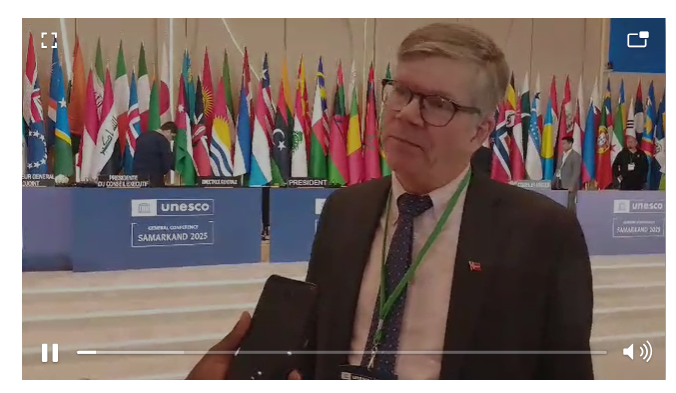Listen to the article
Education Experts Call for Global Action on Misinformation and AI Inclusivity at UNESCO Conference
Education leaders at the UNESCO General Conference in Samarkand have issued an urgent call for strengthened global cooperation to combat misinformation and ensure artificial intelligence development represents diverse cultural perspectives.
During a high-level debate focused on balancing misinformation and disinformation challenges, University of Oslo Rector Svein Stølen emphasized the critical importance of developing robust educational frameworks that promote critical thinking skills across all academic levels.
“In today’s information landscape, the ability to verify sources and evaluate content critically has become as fundamental as literacy itself,” said Stølen, who also chairs the influential Guild of European Research-Intensive Universities.
The conference highlighted growing concerns about AI systems predominantly shaped by Western values and technological priorities. Stølen specifically urged UNESCO to take concrete steps ensuring artificial intelligence development incorporates diverse cultural contexts and ethical frameworks from around the world.
“We cannot allow AI to become another vector of cultural homogenization,” Stølen noted. “These systems must reflect the rich tapestry of human values and ethical considerations from all regions, not just those with the most technological capital.”
Participants expressed particular concern about the widening digital divide affecting developing nations, with African countries facing significant challenges in both AI adoption and fundamental digital literacy. This technological gap threatens to exacerbate existing educational and economic inequalities on the continent.
To address these disparities, Stølen detailed several promising initiatives involving collaboration between European and African universities. These partnerships aim to build technical capacity, develop culturally-relevant AI applications, and create sustainable innovation ecosystems across the African continent.
“The future of AI must be inclusive by design, not as an afterthought,” said one conference participant from Kenya’s educational technology sector. “This requires intentional investment in digital infrastructure and education systems across developing regions.”
The UNESCO conference comes at a pivotal moment as nations worldwide grapple with the dual challenges of rampant misinformation and the rapid advancement of AI technologies. Recent studies indicate that nearly 70% of adults worldwide encounter misleading information online daily, with serious implications for public discourse and democratic processes.
Education experts at the conference outlined several practical approaches to address these challenges, including curriculum reforms to incorporate media literacy from elementary through higher education, professional development programs for teachers, and public awareness campaigns targeting vulnerable populations.
The discussion also touched on the role of multinational technology companies, with several speakers calling for greater transparency in algorithmic design and content moderation practices. Others advocated for regulatory frameworks that balance innovation with social responsibility.
UNESCO’s leadership emphasized that addressing these complex issues requires multistakeholder collaboration across government, academia, industry, and civil society. The organization announced plans to develop new guidelines for AI ethics in education and support member states in implementing comprehensive digital literacy programs.
As the conference continues, delegates are expected to produce a framework document outlining specific commitments and action plans for building education systems capable of fostering critical thinking skills while ensuring equitable access to emerging technologies.
“The challenges we face are global in nature,” concluded Stølen. “Our response must be equally collaborative and forward-thinking if we hope to harness the potential of AI while safeguarding our information ecosystem for future generations.”
Verify This Yourself
Use these professional tools to fact-check and investigate claims independently
Reverse Image Search
Check if this image has been used elsewhere or in different contexts
Ask Our AI About This Claim
Get instant answers with web-powered AI analysis
Related Fact-Checks
See what other fact-checkers have said about similar claims
Want More Verification Tools?
Access our full suite of professional disinformation monitoring and investigation tools




8 Comments
Absolutely critical that we address misinformation and lack of digital literacy. Ensuring AI development reflects diverse cultural perspectives is key to building inclusive, ethical systems.
Couldn’t agree more. Investing in robust educational frameworks is vital to empower critical thinking in the digital age.
Interesting to see education leaders calling for AI systems to incorporate diverse global perspectives. Crucial that technological innovation aligns with ethical principles from different cultures.
Absolutely. Leveraging AI to benefit all of humanity, not just a narrow segment, should be a key priority.
Developing critical thinking skills is so important in the digital age. Glad to see the push for education reform to address misinformation and promote digital literacy.
Concerning to hear AI systems are predominantly shaped by Western values. We need to see more global collaboration and consideration of diverse ethical frameworks in this technology.
Agreed. UNESCO should take concrete steps to make AI development more inclusive and representative of different cultural contexts worldwide.
Bridging the AI divide and combating misinformation are huge challenges, but crucial for a more just, equitable future. Hope to see meaningful progress from this UNESCO conference.